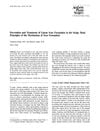 9 citations,
January 1995 in “Aesthetic Plastic Surgery”
9 citations,
January 1995 in “Aesthetic Plastic Surgery” New suturing technique with wider intervals and shallow stitches helps prevent scalp scars and promotes hair growth.
9 citations,
April 2019 in “Bioscience, biotechnology, and biochemistry” Ten miRNAs may play key roles in starting secondary hair follicle development in sheep foetuses.
 8 citations,
January 2014 in “BioMed Research International”
8 citations,
January 2014 in “BioMed Research International” Eclipta alba extract was found to be effective in promoting hair growth in hairless mice.
[object Object]  7 citations,
January 2019 in “Pharmaceutical Biology”
7 citations,
January 2019 in “Pharmaceutical Biology” Eclipta prostrata helps hair growth and maintains the growth phase by affecting certain growth factors.
 6 citations,
March 2021 in “Journal of Cosmetic Dermatology”
6 citations,
March 2021 in “Journal of Cosmetic Dermatology” PRP injections promote hair growth and increase hair density in androgenic alopecia.
4 citations,
March 2022 in “BioEssays” Hydra can help understand human hair follicle microbiomes and develop new skin disease therapies.
 4 citations,
May 2021 in “Biomedicines”
4 citations,
May 2021 in “Biomedicines” Targeting the protein Caveolin-1 might help treat a type of scarring hair loss called Frontal Fibrosing Alopecia.
 4 citations,
December 2020 in “Mammalian genome”
4 citations,
December 2020 in “Mammalian genome” Harlequin mutant mice have hair loss due to low AIF protein levels and retroviral element activity.
 4 citations,
October 2016
4 citations,
October 2016 Herbs like aloe vera and amla are effective and safe for treating hair loss.
 3 citations,
August 2012 in “Annals of Diagnostic Pathology”
3 citations,
August 2012 in “Annals of Diagnostic Pathology” AIDS may cause changes in the scalp that increase infection risk and hair loss.
 2 citations,
May 2023 in “bioRxiv (Cold Spring Harbor Laboratory)”
2 citations,
May 2023 in “bioRxiv (Cold Spring Harbor Laboratory)” Sebaceous glands can heal and regenerate after injury using their own stem cells and help from hair follicle cells.
 2 citations,
March 2020 in “International Journal of Molecular Sciences”
2 citations,
March 2020 in “International Journal of Molecular Sciences” Topical treatments can deliver active molecules to skin stem cells, potentially helping treat skin and hair disorders, including skin cancers and hair loss.
 2 citations,
February 2016 in “Vestnik dermatologii i venerologii”
2 citations,
February 2016 in “Vestnik dermatologii i venerologii” The comprehensive treatment with biomimetic peptide lotion was effective for hair loss.
 1 citations,
October 2022 in “Annals of Translational Medicine”
1 citations,
October 2022 in “Annals of Translational Medicine” Cucurbitacin helps mice grow hair by blocking a protein that stops hair growth.
[object Object]  1 citations,
October 2013 in “Expert Review of Dermatology”
1 citations,
October 2013 in “Expert Review of Dermatology” Diagnosing alopecia areata is challenging and requires careful examination and various tests to distinguish it from other hair loss types.

Hair RiseTM microemulsion effectively promotes hair growth and treats hair loss better than standard treatments.
 April 2024 in “Histochemistry and cell biology”
April 2024 in “Histochemistry and cell biology” N-acetylcysteine may prevent hair loss caused by chemotherapy.
 April 2024 in “Biomedicine & pharmacotherapy”
April 2024 in “Biomedicine & pharmacotherapy” Pilose antler extract helps hair grow in mice with a type of hair loss by speeding up the growth phase.
 February 2024 in “International Journal of Molecular Sciences”
February 2024 in “International Journal of Molecular Sciences” Hair loss in Androgenetic Alopecia is caused by genetics, aging, and lifestyle, leading to hair follicle shrinkage and related health risks.
 October 2023 in “bioRxiv (Cold Spring Harbor Laboratory)”
October 2023 in “bioRxiv (Cold Spring Harbor Laboratory)” Immune cells are essential for early hair and skin development and healing.
 September 2023 in “Biomedical Optics Express”
September 2023 in “Biomedical Optics Express” New imaging techniques show testosterone delays hair growth and shrinks follicles in mice, but have limited depth for viewing.
 May 2022 in “Journal of the Egyptian Women's Dermatologic Society (Print)”
May 2022 in “Journal of the Egyptian Women's Dermatologic Society (Print)” Women's hair loss can be due to hormonal changes and various conditions, with treatments focusing on stopping progression and managing symptoms.
 June 2021 in “Journal of Emerging Technologies and Innovative Research”
June 2021 in “Journal of Emerging Technologies and Innovative Research” Rice water and hibiscus can help improve hair health and growth.
 November 2018 in “Springer eBooks”
November 2018 in “Springer eBooks” Finasteride and minoxidil are effective, low-risk treatments for male hair loss, and patient education on these therapies is important.
January 2016 in “Dermatology Online Journal” Hormonal therapy changes skin and hair in transgender patients, who need better researched dermatologic care.
November 2022 in “Journal of Nanobiotechnology” The developed system could effectively treat hair loss and promote hair growth.
October 2022 in “Experimental Dermatology” New technologies show promise for better hair regeneration and treatments.
 15 citations,
September 2015 in “Journal der Deutschen Dermatologischen Gesellschaft”
15 citations,
September 2015 in “Journal der Deutschen Dermatologischen Gesellschaft” Skin doctors should recognize and treat conditions like hair-pulling and skin-picking early, often using therapy and medication, to help 50-70% of patients.
 2 citations,
October 2016
2 citations,
October 2016 Chemotherapy and radiotherapy can cause skin side effects like rashes, hair loss, and nail changes, which are usually managed with conservative treatments.
 February 2020 in “International Journal of Research in Dermatology”
February 2020 in “International Journal of Research in Dermatology” Platelet rich plasma is not proven as a treatment for hair loss despite some improvements.

























